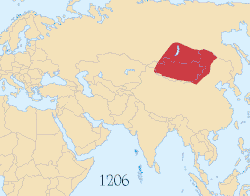Mongol Empire

The Mongol empire is still one of the biggest empires in the world that also brought peace and hope in people. They weren’t just big and outstanding because of their “dominant military force” (Hays, 2015). The Mongol rule was positive and superior because it brought many cultural advancements that are still relevant to this day and in other parts of the world. The Mongols improved trading with the west and made it safer for the people, and by doing this, more merchants traded and improved the Mongol’s way of life. They also allowed “free practice of religion” (Historyonthenet, 2017), a very rare thing in those times, which improved the way people interact with each other and showed the Mongols had respect for the others. Finally, the Mongols brought Pax Mongolica or Mongol peace to their conquered lands, that all empires bring but not as much as the Mongols did. For these reasons, the Mongol dynasty was beneficial to the ancient world by creating an ambient of peace, respect, and flourishment by making many cultural advancements.
The Mongol empire brought safety to the trading routes like the Silk Road and improved the trading with the west. They improved these trading routes to help the people around them but to also aid themselves. Since the Mongols were “pastoral, nomadic people” (Historyonthenet, 2018) they focused on herds. For this reason, they could not get many of the basic supplies they needed to live and sustain themselves. The solution they found to this problem was to improve trade with the western world by making the Silk Road safer and giving it maintenance after it became “all abandoned” (Budanovic, 2018). By “offering protection to merchants” (Historyonthenet, 2018), they encouraged merchants to trade with them so that they can get their essential supplies. This improvement in trade allowed Mongols and the eastern world to get goods from the west so that they could improve their way of life. This is one of the reasons the Mongol empire was beneficial to the people it ruled and even essential to their daily life.
The Mongols did not only accept the goods that came from the west and anywhere else by the Silk Road but they also accepted anyone's religion. Impressively, the Mongols were the first ever to allow “free practice of religion” (Historyonthenet, 2017) in ancient times. As the Mongols grew bigger and began conquering vast amounts of land they decided the best was to have “religious tolerance as a policy” (Historyonthenet, 2017). This policy allowed them to be ensured easier governance and gave populations they conquered with freedom instead of oppression in the religious aspect. The Mongols had these policies, unlike their neighbors, to be sympathetic towards the people they conquered instead of “antagonizing” (Historyonthenet, 2017) them. The Mongols by doing this not only ruled their people easier but showed respect and compassion for them. This aspect of the Mongol empire is not only positive and beneficial but it is innovative and shows how open-minded the Mongols were that not even some societies today are that liberal towards religion.
The Mongol empire is the largest and most vast “contiguous empire the world has ever seen” (Johnson & Rogers, 2011). They conquered the most amount of land, therefore, stopping many wars between different populations in conflict. This peace brought by the Mongol empire to the people they conquered is called Pax Mongolica. As they are the second biggest empire, after the British empire, they have brought the most amount of people to peace by conquering them. This is advantageous and beneficial to the people they conquered because they “brought their enemies and other enemies all into peace and unity” (Ancientorigins, 2018). This period of “peace and prosperity” (Szczepanski, 2017) stopped many wars and innocent people from dying as there was no rival to battle against. The Pax Mongolica the Mongol empire brought saved many lives, relationships, and worries people had about their rival group or country and was therefore beneficial.
The cultural advances the Mongols did, show they were ahead of their time and very liberal. They allowed freedom of religion which not even societies today have, in those times. They thought not only about themselves but the people they conquered and their well-being physically and mentally. They really cared about their people’s physical beings as they saved many lives during the period of Pax Mongolica by stopping wars. The Mongols also cared about their people’s mental well-being as they realized someone’s physical state is not the only feature in a human. The Mongols did this by having freedom of religion so that the people they ruled “followed their beliefs and traditions” (Historyonthenet, 2017) to be satisfied with their spiritual and religious way of life. “Part of what made the economy so good was its trade and communication” (Themongolschina, 2016) that the Mongol empire achieved by making the trade in the Silk Road safer. This improved the way of life of many people the Mongols conquered by making the way of life better. All these reasons make the Mongol empire operable to classify as beneficial as it positively impacted the lives and way of life of the people it ruled and the ones around them.
